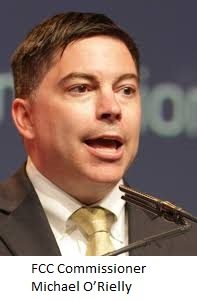
“The Commission is well aware that industry is facing numerous challenges to install the hundreds of thousands of new wireless towers and antennas that are going to be needed to meet the insatiable demand for mobile services and new wireless technologies, such as 5G,” O’Rielly said.
O’Rielly cited excessive delays and moratoria when filing siting applications for access to locality rights-of-way and long pre-application processes before an application can be filed or is deemed complete. Some applicants are going through two years or more of review before a decision is actually made. For example, O’Rielly said, one company reports that, in Florida alone, there are 26 jurisdictions that have installed moratoria. While most of these delays last for more than 180 days, in the case of at least two localities, they extended more than two years.
“Permitting applications are being rejected for indefensible reasons, such as aesthetics, radiofrequency concerns, or because localities don’t agree with the proposed type or placement of equipment,” he said.
O’Rielly said telecom developers are being asked to pay astronomical fees for approvals, “which is unsustainable when thousands of small cells, generally the size of bread boxes, will need to be deployed.” Providers report that they are paying not only large one-time application fees, but also franchise, use, contractor and even annual fees. For instance, O’Rielly said, some localities charge as much as $5,000 or $10,000 per site to review antenna structure applications and agreements. Some localities charge for the consultants reviewing siting applications, which can be $8,500 per pole with additional inspection fees after installation. Some also charge recurring yearly fees of $6,000 per pole, while others take a percentage of gross revenues.
“These are not acceptable responses to new small cell technologies that need to be deployed for the U.S. to maintain its position as the leader in wireless communications,” he said.
The FCC has three open proceedings about facilitating infrastructure installations, and also instituted the Broadband Deployment Advisory Committee to examine and resolve these types of issues.“If this situation is not resolved quickly and satisfactorily, the Commission must be willing to use its preemption authority against those governmental entities,” O’Rielly said.
October 20, 2017




Reader Interactions